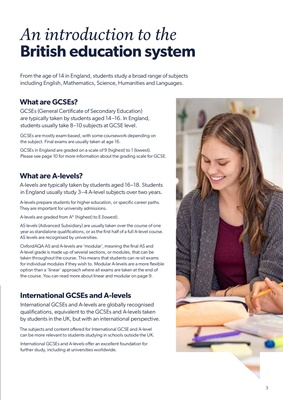
From the age of 14 in England, students study a broad range of subjects
including English, Mathematics, Science, Humanities and Languages.
What are GCSEs?
GCSEs (General Certificate of Secondary Education)
are typically taken by students aged 14-16. In England,
students usually take 8-10 subjects at GCSE level.
GCSEs are mostly exam-based, with some coursework depending on
the subject. Final exams are usually taken at age 16.
GCSEs in England are graded on a scale of 9 (highest) to 1 (lowest).
Please see page 7 for more information about the grading scale for GCSE.
What are A-levels?
A-levels are typically taken by students aged 16-18. Students
in England usually study 3-4 A-level subjects over two years.
A-levels prepare students for higher education, or specific career paths.
They are important for university admissions.
A-levels are graded from A* (highest) to E (lowest).
AS levels (Advanced Subsidiary) are usually taken over the course of one
year as standalone qualifications, or as the first half of a full A-level course.
AS levels are recognised by universities.
OxfordAQA AS and A-levels are 'modular', meaning the final AS and
A-level grade is made up of several sections, or modules, that can be
taken throughout the course. This means that students can re-sit exams
for individual modules if they wish to. Modular A-levels are a more flexible
option than a 'linear' approach where all exams are taken at the end of
the course. You can read more about linear and modular on page 9.
International GCSEs and A-levels
International GCSEs and A-levels are globally recognised
qualifications, equivalent to the GCSEs and A-levels taken
by students in the UK, but with an international perspective.
The subjects and content offered for International GCSE and A-level
can be more relevant to students studying in international schools.
International GCSEs and A-levels offer an excellent foundation for
further study, including at universities worldwide.
An introduction to the
British education system
3